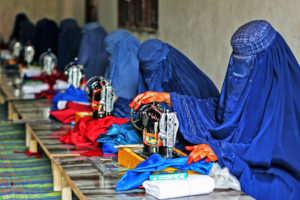During the US evacuation of Afghanistan, as the mainstream press argued about the fate of translators, or the evacuation of Pen Farthing’s dogs, the online Right had fun tweaking progressive noses by cheering on the Taliban. The return of veiling for women was celebrated and pictures of Afghans atop abandoned US weaponry were gleefully shared. Memes contrasted a purportedly effete, rainbow-flag-promoting US military with pious, self-confidently masculine warrior Afghans. And a jihadi version of the hypermasculine “Gigachad” meme popped up, dubbed “Talichad”.
But though Talichad won the insurgency, could he still lose the peace? Young Taliban fighters, whose daily life has been transformed by victory, have been interviewed for a new report — and it turns out many don’t like it. Put to work in Kabul’s bureaucracy, they find office work dull and restrictive, and they miss the excitement, fellowship and lofty moral purpose they felt as insurgents. Not only do they loathe office work every bit as much as the West’s much-discussed “quiet quitters”, but peacetime urban life appears to be making them soft and, well, less Taliban-ish.
This, in turn, raises some questions for the online masculinist Right in the West: the men who made a totem of Talichad. For the Taliban’s predicament now offers a counterfactual to a doctrine from these circles, that’s now leaking into the mainstream: that every facet of modern male malaise is the fault of women, and especially of feminism.
This idea circulates, in condensed form, via the term “longhouse”. This originates with the now-notorious internet anon Bronze Age Pervert (BAP), author of the influential 2018 Bronze Age Mindset. Ironically, the term accepts wholesale a set of revisionist claims made by feminist archaeologists, such as Heide Göttner-Abendroth, who argue the very earliest societies lived in collective “longhouse” dwellings — and were matriarchal.
For Göttner-Abendroth and her fellow feminists, these longhouse-dwelling matriarchies were characterised by egalitarianism and sharing of resources and caring obligations, traits they viewed as positive and worthy of revival. From the perspective of Bronze Age Pervert and his online followers, though, such societies are beneath contempt, dragging the natural excellence of some into the feminised morass of the many.
And, contra the feminists, such matriarchy isn’t something we should revive — because it’s already here. For BAP, the modern world is already one huge metaphorical “longhouse”. In it, we are told, Western men have grown contemptibly soft, relinquishing a life of confident vitality in favour of a weak and resentful mass culture of collectivism. BAPists assert that under this suffocating order, masculine excellence is resentfully nipped in the bud at every turn by a stifling, safety-obsessed egalitarianism of the lowest common denominator, whose enforcers act like burrowing termites to hollow out everything good about our civilisation, leaving behind only crumbling ruins to be picked over by whiny, feeble, and increasingly asexual moral pygmies.
And this is all women’s fault. When the “longhouse” meme completed its transition to familiar jargon recently, in an explainer on the term published by First Things, the author ‘Lomez’ linked it explicitly with the growing prevalence of women in public life. In BAP’s view, “feminism and the liberation of women” is “both the proximate and the ultimate cause” of this nightmarish world, which Bronze Age Mindset characterises luridly as presided over by “some kind of half-human half-cockroach creature resplendent with horrid eggs like a big Amazon centipede…this seeks to re-absorb you”.
As the “longhouse” concept has percolated out of group chats and Discord servers, so too has this correlation grown more accepted, between emotivism, safetyism, suffocating egalitarianism — and the rising prevalence of women in public life. Essays now come thick and fast: political scientist Richard Hanania tackled the relation between female-typical social patterns and changing norms of political debate and conflict, and the journalist Heather Mac Donald argued that the feminisation of American academia is now “almost complete”. She suggests that this has been accompanied by a transition away from norms of truth-seeking and open debate, toward a culture characterised by emotional volatility, anxiety and a fixation on vulnerability.
Conservative campaigner Christopher Rufo developed Mac Donald’s arguments to suggest that a public culture that over-emphasises “trait empathisation”, which is to say a more female-typical style of relating, has negative downstream consequences including normalising psychological disequilibrium, and leaving young people permanently infantilised. A consensus is emerging on the Right, then, that the feminisation of public life is causing (or at least linked to) a great many things the Right views as disagreeable. As these arguments bleed into mainstream discourse, though, few have the forthrightness of your average internet anon. The anti-woke activist James Lindsay may say “woke is a woman”, for example, but he’s lighter on what that implies in policy terms. Mac Donald and Rufo are likewise at pains to make clear that they aren’t saying female-typical traits and preferences are bad or in need of elimination.
Meanwhile, the anons mutter that surely the solution to a problem that started with the feminisation of public life is, well, defeminising it again — or just walking away to start something new. BAP advocates exiting the “longhouse” for life as a “Bronze Age pirate”; it’s not wholly clear what this means, but the overall impression is of all-male groups, perhaps mercenaries, or something not dissimilar to bands of Taliban insurgents. In any case, it’s clear enough that many cheered on the Taliban for evicting women from schools and workplaces, in no small part for achieving what they only fantasise about: a public square purged of women.
But, speculating wildly, imagine the Talichad celebrators got their way and booted women out of public life. Would that result in a return of manliness? The first-person accounts of Taliban fighters now working in Kabul’s bureaucracy suggests: possibly not. For it appears that no matter how manly your mujahideen, when you transpose them to a high-tech metropolis and put them to work in Excel spreadsheets, they’ll begin to drift toward the social and psychological conditions deplored by BAPists in the West.
Bronze Age Mindset chafes against a sense of life lived in captivity, where all space is already “owned” and freedom of action always already circumscribed. And we find an echo of that same sense of constraint in the grumbles of Huzaifa, 24, about his post-victory loss of freedom: “The Taliban used to be free of restrictions, but now we sit in one place, behind a desk and a computer 24 hours a day seven days a week. Life’s become so wearisome; you do the same things every day.”
City life seems to drive alienation and moral degeneracy, too: several fighters lament how atomised everyone is there, and deplore the sight of their comrades succumbing to temptation: drug use, hot girls, material possessions. And cubicle-drone life is so boring and repetitive that many spend their days slacking on social media instead: “Many mujahedin, including me, are addicted to the internet, especially Twitter,” admits Abdul Nafi. Social media addiction thus completes the transition of these young men, from “Talichads” admired by alienated, underpaid, extremely online urban “quiet quitters” in the West into alienated, underpaid, extremely online urban “quiet quitters” in Kabul.
And in this case, it’s indisputably not women’s fault. As is well-documented, to mainstream lamentations and 4chan glee, there are no Afghan women in these workplaces. For the Taliban, then, the exchange of masculine camaraderie and freedom for alienation, constraint and moral degradation has not involved the female HR managers, DEI administrators and the like whom the masculinist Right generally blame for their woes. And this suggests that at least some of the “longhouse” phenomena now being reflexively blamed on women may be less a malign byproduct of literal workplace feminisation than a consequence of working an office job in a high-tech, 21st-century urban environment.
The notorious anti-technology terrorist Ted Kaczynski made a version of this point in his manifesto, arguing that modern men and women are “oversocialised” into neurosis, powerlessness and anxiety as a byproduct of the distorting effect industrial society has on human nature. Today, “Uncle Ted” is himself a popular underground literary influence, and source of internet memes. But he was arrested before the mass spread of the internet, and to my knowledge has not commented on its contribution to the conditions he deplored. Yet perhaps the bitterest irony of all is that the internet acts as an accelerant on all the phenomena Kaczynski described. Thus, as the Taliban have taken to the internet — whether to promote recognition of their regime or just ease the boredom of cubicle life — they’ve been drawn, by degrees, into the most captivating “longhouse” of all.
The struggle sessions, cancel culture and purity spirals routinely blamed by the Hananias of this world on political feminisation happen among anonymous Right-wing body-builders too. And this is because, as I’ve argued before, social media itself forces even the most committedly masculinist groups into female-typical social patterns: covert aggression, public scolding, punishment via ostracism and so on. When your principal means of interaction incentivises endless talking, even as it forecloses physical confrontation, how is anyone meant to navigate disagreements except via stereotypically feminine social patterns such as “calling out”, backbiting, emotional drama or cancelling wrongdoers?
Things are rarely monocausal, and social and material feedback loops are complex. I don’t doubt that the presence of more women in the workplace makes some contribution to the tone of public life. Indeed, I’ve made that case myself, though needless to say I don’t think this is an argument for Taliban-style purges. But I suspect that for those very online males currently fantasising about making everything less longhouse-y, and wishing they could do so by just getting women to shut up, actually succeeding would make less difference than they imagined.
For probably the only way the online masculinist Right could exit the “longhouse” entirely would be by passing the Taliban in the opposite direction, and exiting the modern world. And, especially, exiting the internet. And it seems not even the Taliban is willing to do that.
Disclaimer
Some of the posts we share are controversial and we do not necessarily agree with them in the whole extend. Sometimes we agree with the content or part of it but we do not agree with the narration or language. Nevertheless we find them somehow interesting, valuable and/or informative or we share them, because we strongly believe in freedom of speech, free press and journalism. We strongly encourage you to have a critical approach to all the content, do your own research and analysis to build your own opinion.
We would be glad to have your feedback.
Source: UnHerd Read the original article here: https://unherd.com/




